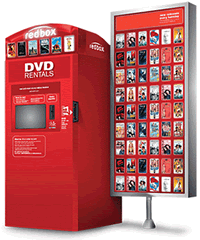
A few months ago, the tech blogosphere exploded after rumors emerged that Amazon.com was considering opening physical retail stores. Since those reports, we haven’t heard a peep about whether the Seattle online retailer would break with tradition and expand into the choppy waters of brick-and-mortar retail.
But there’s another possibility that could resolve some of the headaches associated with running physical stores — the absolute pain of hiring and managing sales clerks — while offering a lot of benefits — better distribution and marketing of products.
Automated retail kiosks.
And who is the leader in that space? A company just a stone’s throw away from Amazon’s worldwide headquarters in Seattle: Coinstar.
The idea of marrying the two companies was proposed today in an online presentation hosted by the Corum Group, a boutique Seattle M&A advisory firm. I tuned in to the Webcast, and after hearing Corum’s Elon Gasper and Jon Scott debate the merits, here’s what I was left thinking: In a world of off-the-wall predictions, this one actually makes a ton of sense.
Amazon’s lack of a retail presence — while a huge advantage in the past — is a weakness at a time when the online and offline worlds are colliding in fascinating ways. (Starbucks’ digital push is a great example of this, as is Apple’s ever-expanding retail empire).
Big Amazon.com competitors — like Walmart and Target — are finally starting to use their physical footprints as weapons as they go after their more nimble rival. They also are expanding aggressively on the Internet, buying up talent and technologies.

The Corum Group’s Gasper and Scott think Amazon — which has purchased companies such as Quidsi, Kiva Systems and Zappos in recent years — needs to make its move.
“Clearly Amazon has been left crying in its clicks after being jilted by Target,” said Gasper. “Amazon is really the only one of these major retail tech companies that would seem to need a partner.”
Scott added that Amazon will not want to commit to the “margin-killing HR overhead of managing human clerks and salespeople,” suggesting that Amazon’s greatest strength is its powerful delivery system. And that’s one of the reasons why Coinstar — with a market value of $2 billion — could be so attractive.
In other words, Amazon could get a physical presence without the retail staff.
“Together, Coinstar and Redbox already have thousands of automated kiosk-style vending machines in high traffic areas that consumers can order DVDs or video games from remotely and pick up when they grab dinner—all without human contact,” said Gasper.
Added Scott: “It’d be a retail jumpstart on a secure channel for Kindle and other high margin items, like its accessories and Amazon published books – simple items that could be dispensed like DVDs.”
And Gasper took the concept one step further, suggesting that the Kiva robots could come in to play by creating a fully-automated retail experience, with the robots sorting and picking orders on the backend while customers placed their order at the storefront.

Imagine it? A brick-and-mortar store with just brick-and-mortar, no flesh and bones. Seems like an Amazon.com dream scenario, and it’s not that far-fetched.
As we’ve reported in the past, the online retailer is expanding its Amazon Locker service at retailers and college campuses, creating a method by which customers can pick up goods that they’ve ordered online.
Now, what’s really interesting about all of this is that I spent a recent afternoon last month at Coinstar’s analyst day, perusing the company’s new lineup of kiosks. Those included a machine called the Gizmo — being tested in a few markets to automatically spit out refurbished electronics to shoppers.
If Amazon.com could gain a physical retail foothold without hiring tens of thousands of sales clerks, don’t you think it would do it?
The Corum Group has been known for making bold predictions in the past, some of which (at least partially) have come to pass.
You may recall that Corum’s Nat Burgess suggested earlier this year that Microsoft should consider buying Barnes & Noble. Just a few months after making the call, Microsoft invested $300 million into the bookseller’s Nook unit as part of an extensive partnership.
Burgess joked on the GeekWire podcast last month that some folks described that prediction as galactically stupid when they first heard it.
I’ve listened to the evidence on a Coinstar-Amazon tie-up, and got to say that this one isn’t stupid at all. In fact, I’d bet this is where Amazon is headed. Just seems like a no-brainer.



